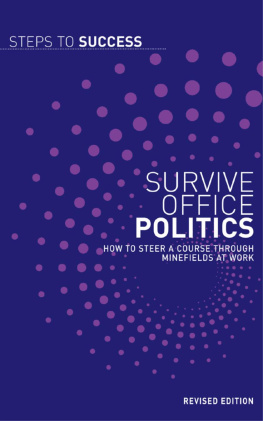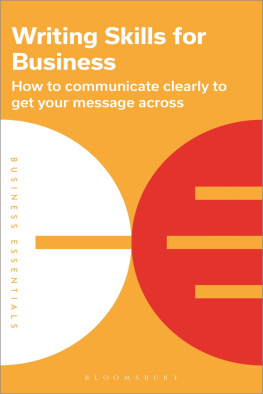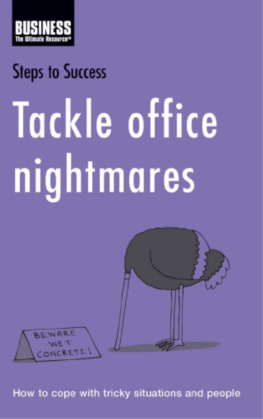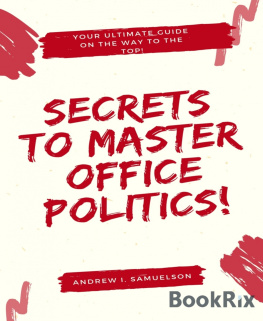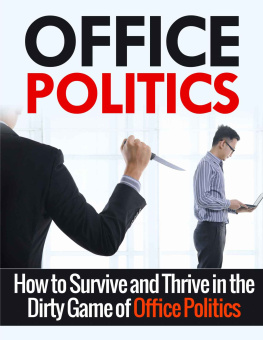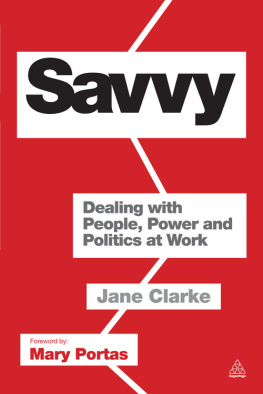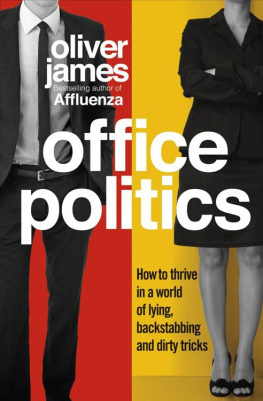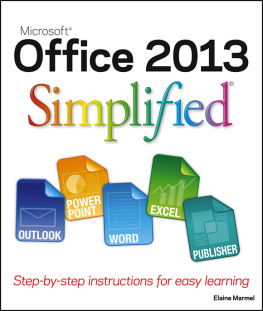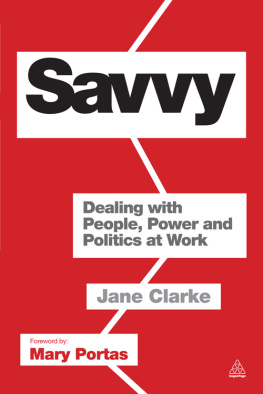Survive
Office Politics
How to steer a course through minefields at work
A & C Black London
Revised edition first published in Great Britain 2009
A & C Black Publishers Ltd
36 Soho Square, London W1D 3QY
www.acblack.com
Copyright A & C Black Publishers Ltd, 2009
First edition 2004 Bloomsbury Publishing 2004
Reprinted 2006, 2007 by A & C Black Publishers Ltd
All rights reserved; no part of this publication may be reproduced, stored in a retrieval system, or transmitted by any means, electronic, mechanical, photocopying or otherwise, without the prior written permission of the Publisher.
No responsibility for loss caused to any individual or organisation acting or refraining from action as a result of the material in this publication can be accepted by A & C Black Publishers Ltd or the author.
A CIP record for this book is available from the British Library.
eISBN: 978-1-40813-407-8
This book is produced using paper that is made from wood grown in managed, sustainable forests. It is natural, renewable and recyclable. The logging and manufacturing processes conform to the environmental regulations of the country of origin.
Design by Fiona Pike, Pike Design, Winchester
Typeset by RefineCatch Ltd, Bungay, Suffolk
Printed in Spain by Graphycems
Contents

Answer the questions and work out your political profile, then read the guidance points.

When you started your job, how long did it take you to learn about the office politics?
a) 10 months b) 5 months c) 1 month
Complete the following statement You get ahead at work by...
a) doing your job well, and doing it by the rules
b) putting the needs and goals of the team ahead of your own
c) watching your back and pushing hard to achieve personal goals
How often do you gossip?
a) Hardly ever b) Fairly regularly c) All the time!
How much does who you know count in your office?
a) I dont know. Everyone keeps to themselves.
b) Not much. I have to perform well and achieve high results to get rewards.
c) A lot. Getting on well with my managers and doing a favour or two for some people will get me a long way.
How well do you get on with your boss?
a) OK. I dont really have much contact with him/her.
b) Very well. We complement each other.
c) Terribly its a complete clash of personalities.
How many trusted allies do you have at work?
a) 1 to 3 b) 4 to 7 c) 8 or more
Do you feel able to be yourself in the office?
a) No b) Not completely c) Yes
How often do you socialise with colleagues?
a) Very seldom b) Fairly regularly c) Very regularly
To what extent do you network?
a) Not at all. I feel awkward about using people.
b) Fairly regularly. It depends if I have a definite need and can see an opportunity.
c) Whenever I can, in case I ever need a favour.
How often do office politics get in the way of work?
a) Never b) Sometimes c) Regularly
How often do you think about non-verbal ways of communicating?
a) Non-what?
b) Quite often. Especially if Im dealing with difficult people and think it might help to build rapport.
c) All the time. I try to copy the way people talk and behave.
a = 1, b = 2, and c = 3. Now add up your scores.
1219: Either you work in an extremely relaxed and open work culture, or youre unwilling to get involved in office politics. Chapters and argue that its important to accept that politics are necessary and unavoidable, and that a certain amount of political nous can be healthy, helping you to get ahead in your career and contribute to the success of the organisationits all about effective communication. Pay attention to non-verbal signs (chapter ), and start making a stronger impression on colleagues (chapter ).
2027: You appear to have a healthy attitude towards the political environment at work, but be wary of being drawn into the culture of gossiping that exists in most officesdont be tempted into politicking! Get advice on how to advance your career by successful networking (chapter ) and by making a great impression on colleagues and managers (chapter ).
2833: Youre at risk of becoming unhealthily embroiled in office politics. Too much gossip is dangerous and unprofessional, and can lose you friendsand your job. Instead of getting involved in negative political manoeuvring, try to expose it. If a difficult relationship with your boss is making office life hard, read chapter . Sometimes relationships with colleagues can turn sour; read chapter for advice on managing office romances, and chapters and to help polish your influencing and communication skills. Theres advice on dealing with the politics of meetings in chapter .
by Kathleen Kelley Reardon
Professor of Management and Organisation at the University of Southern California Marshall School of Business

Many of the hurdles managers must face and overcome have little to do with technical competence. Rather, they have to do with politics. Internal politics is a fact of life in organisations, yet many managers and CEOs will tell you their success is largely due to allowing no politics in their firms. Theyll regale you with stories of how they use and encourage people skills to create a desired environment and accomplish organisational goals. What theyre really talking about is how they use politics.

Step one: Accept that politics is a part of office life
In common vernacular, politics is used to describe what people do to influence decision-makers, accomplish hidden agendas, and surreptitiously advance their careers, often to the detriment of others. But politics is not always so sinister.
By its very nature, politics involves going outside usual, formally sanctioned channels to accomplish objectives. However, it doesnt have to be done in a secretive manner and the results can often benefit everyone involved. When used to influence people in the service of valid company goals, politics becomes a positive tool indeed. The team leader who makes valuable connections with people who can advance the teams efforts is acting politically.
Given two competent people, the one who has political savvy, agility in the use of power, and the ability to influence others is more likely to succeed as a senior manager. Indeed, to the successful senior manager in a competitive organisation, day-to-day life is politics. Thats why smart business people think like Caroline Nahas, managing director of Korn Ferry International, Southern California. To be politically astute, you need to read where the trend lines are and be ahead of the game.
Of course, politics is not always positive. Sometimes, people must defend themselves from political manoeuvring. When surrounded or targeted by colleagues playing underhand political games, job survival may require one to act similarly. In organisations where bias or favouritism dictate who gets key assignments and promotions, political manoeuvring is required to get into the loop.

